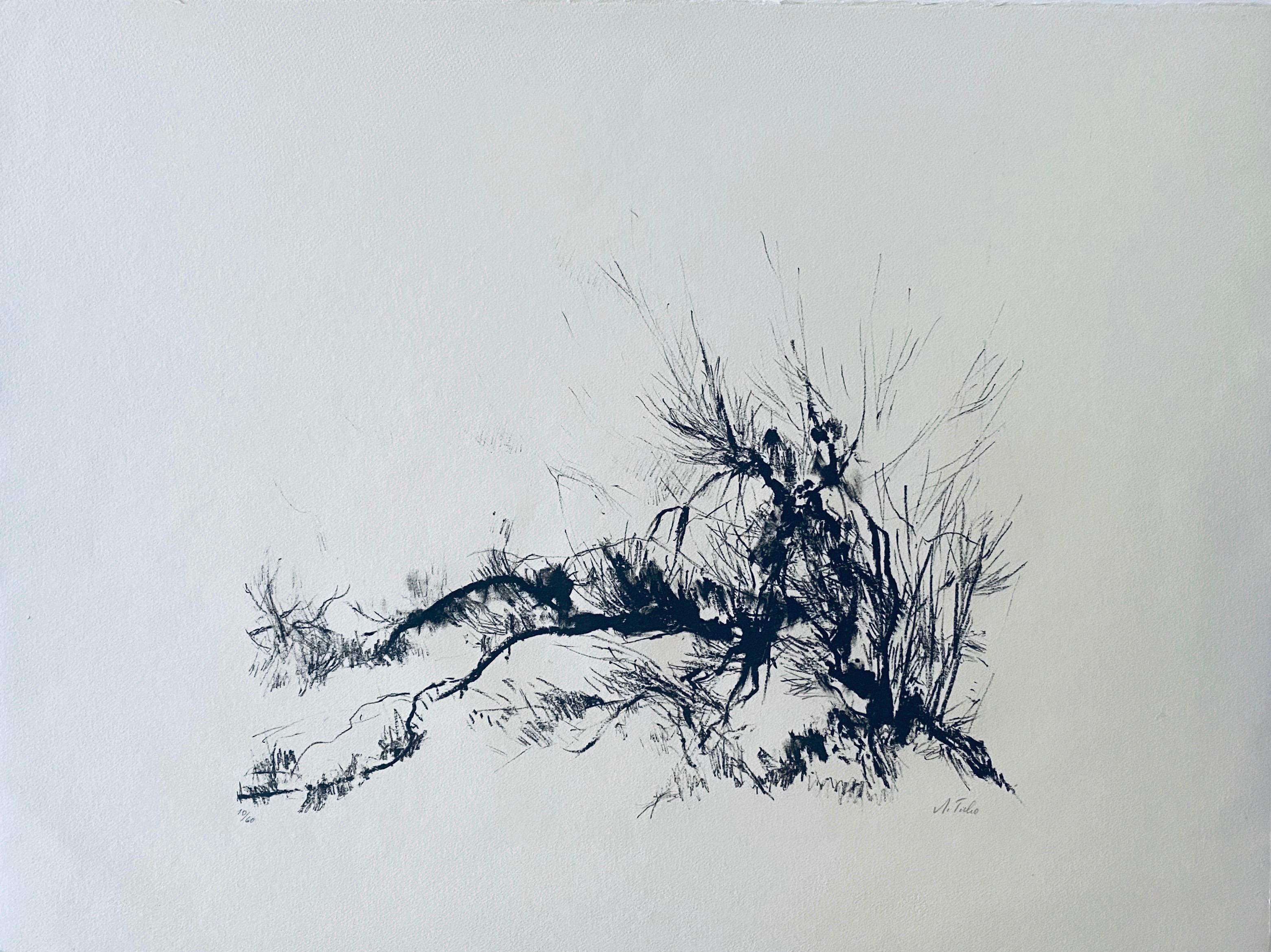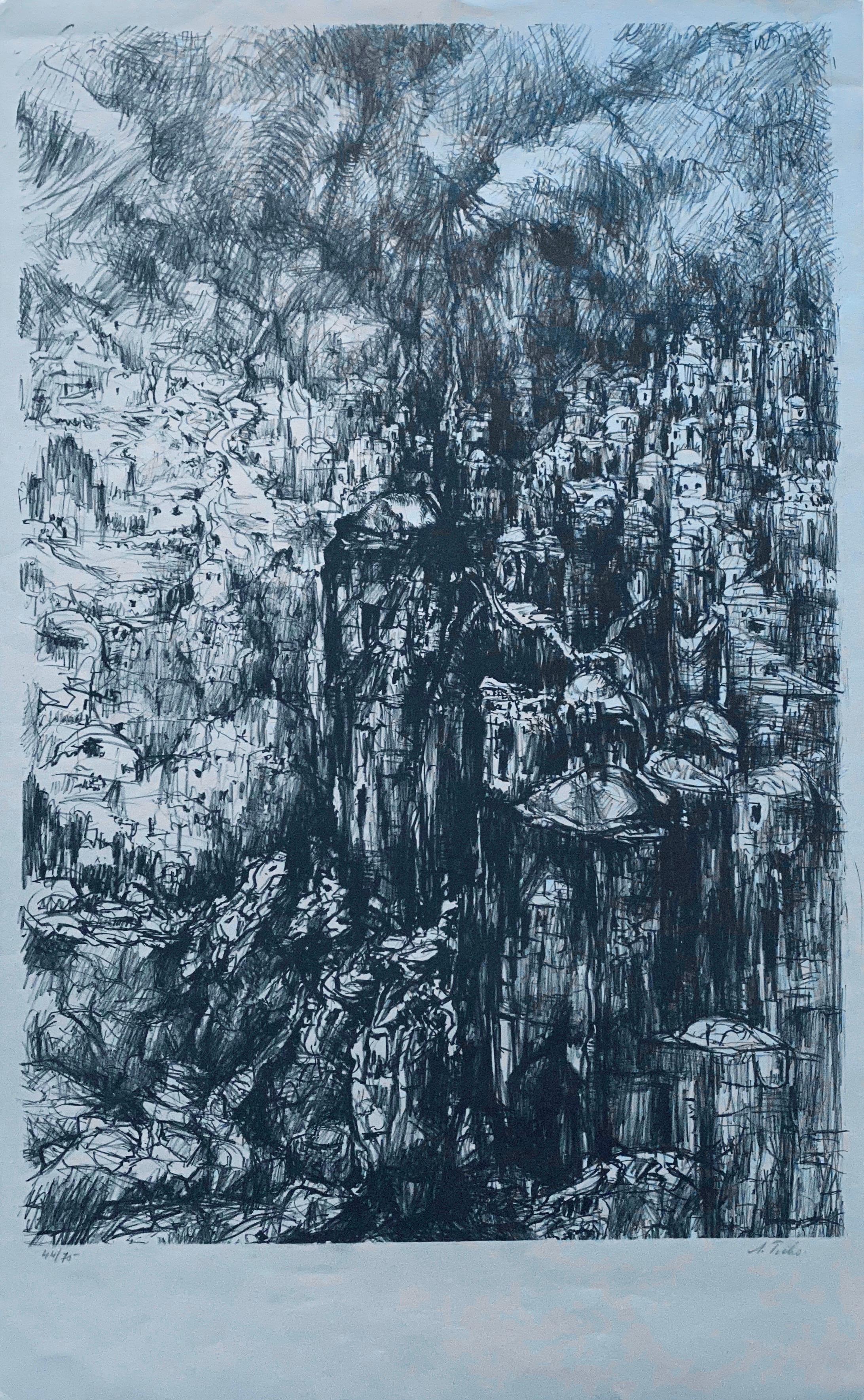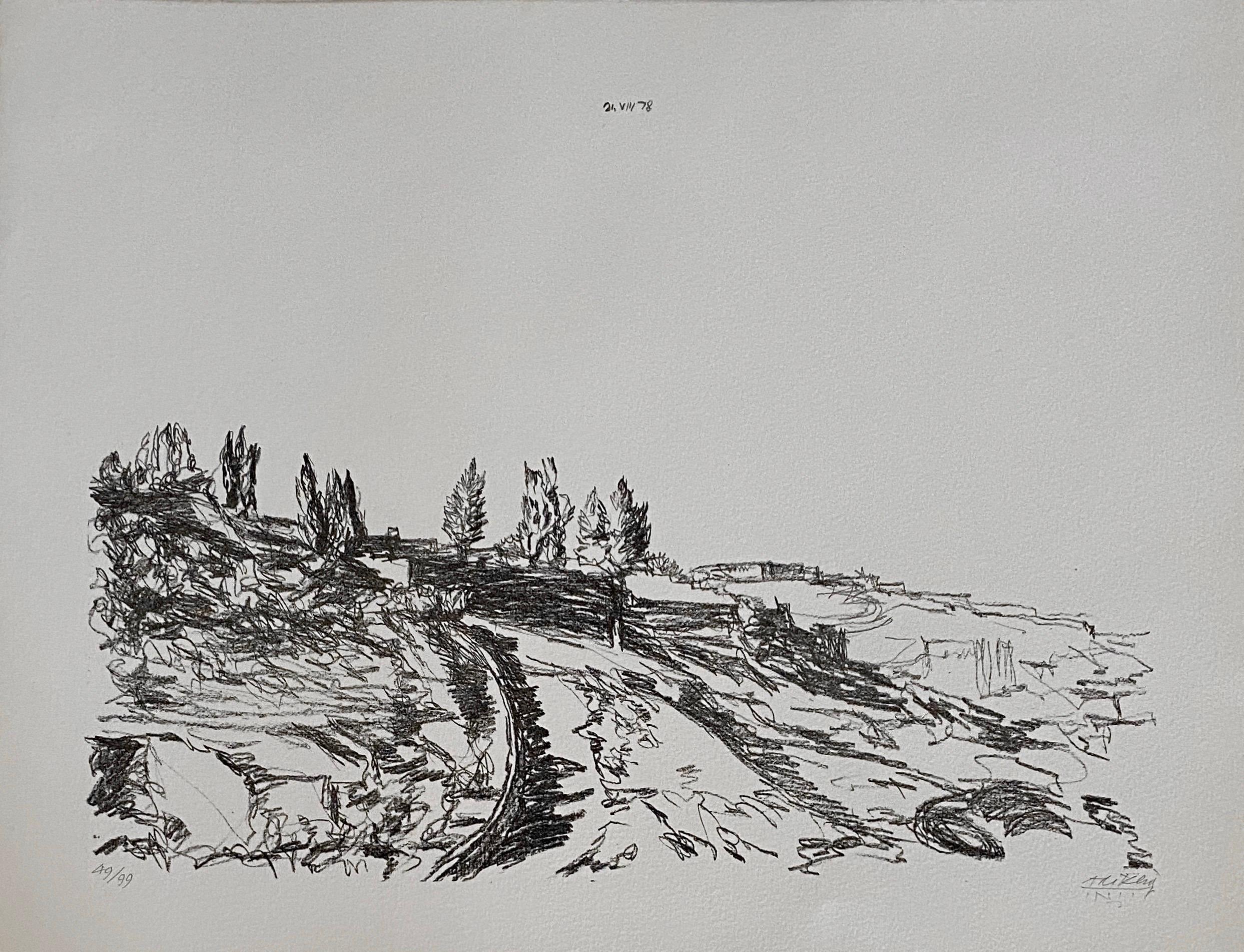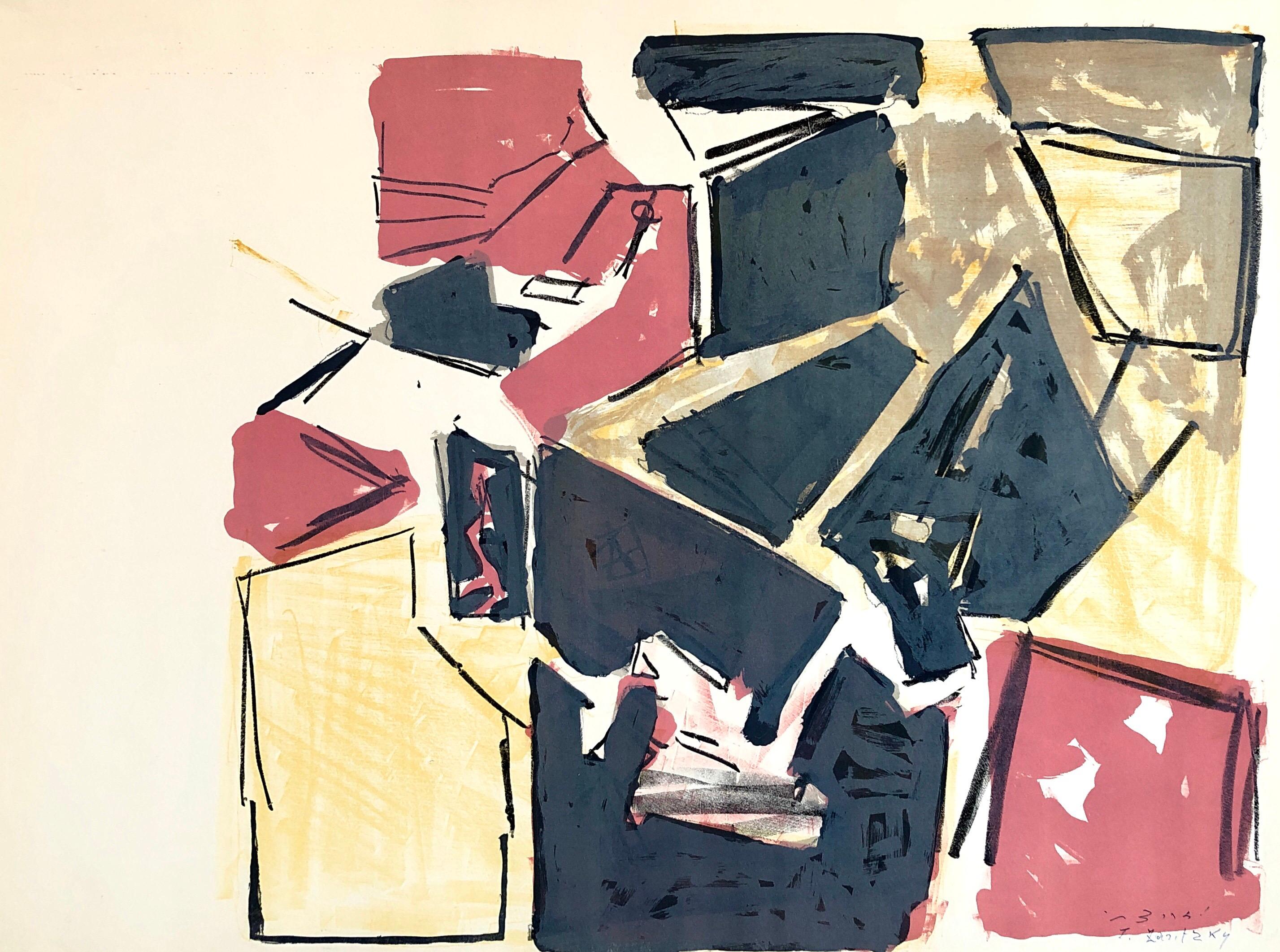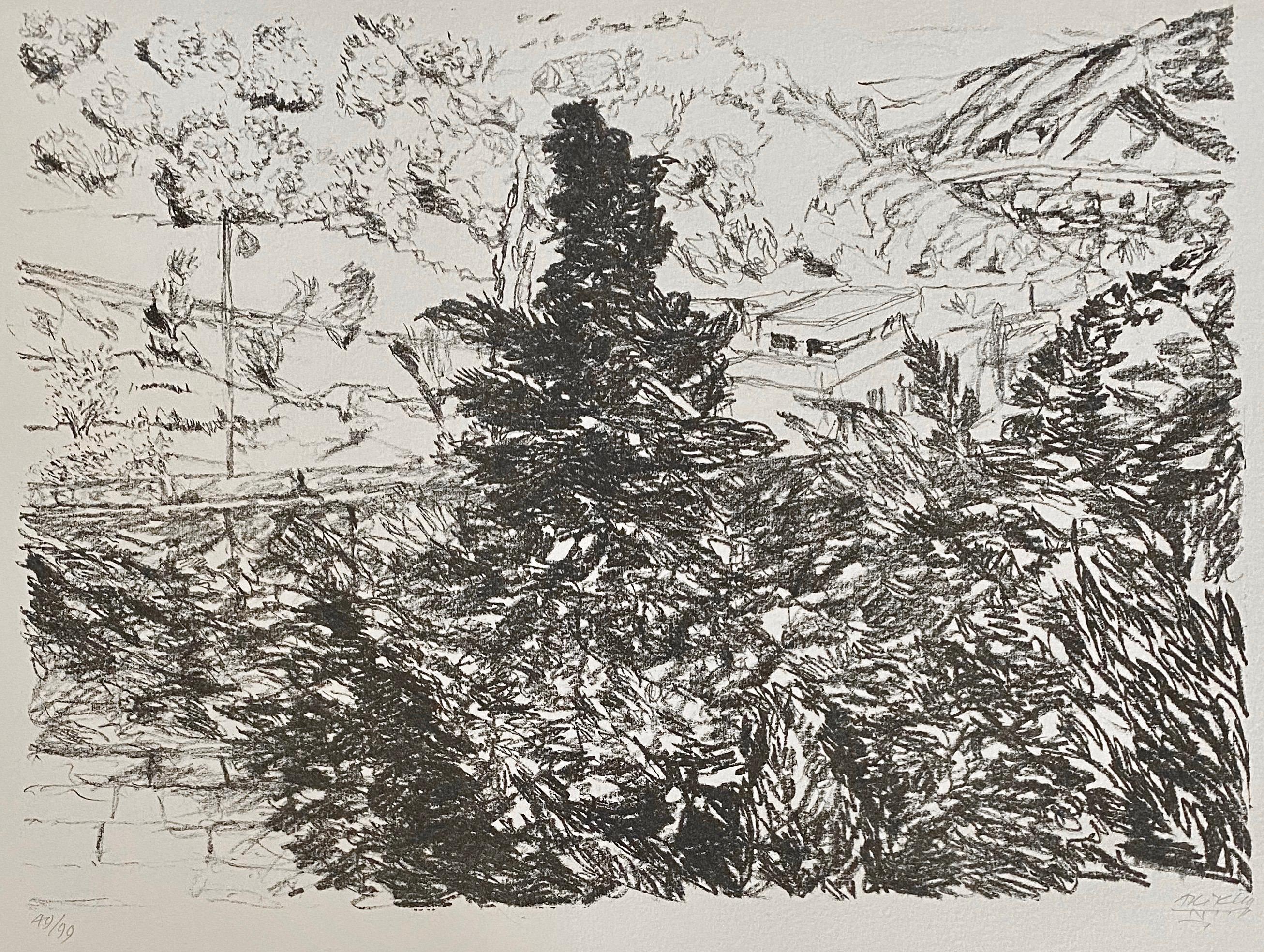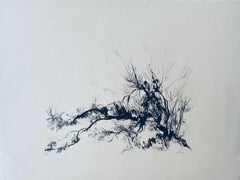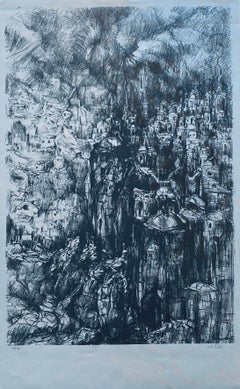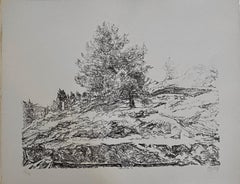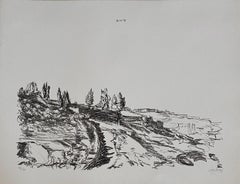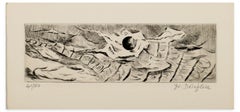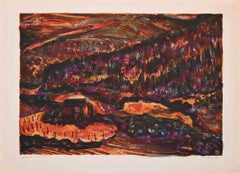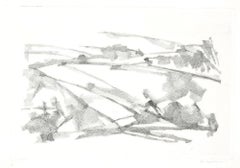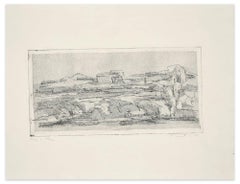Items Similar to German Israeli Expressionist Abstract Lithograph Of Judeah Hills
Want more images or videos?
Request additional images or videos from the seller
1 of 11
Anna TichoGerman Israeli Expressionist Abstract Lithograph Of Judeah Hills
$850
£645.32
€739.51
CA$1,206.46
A$1,315.95
CHF 691.30
MX$15,920.24
NOK 8,648.39
SEK 8,165.80
DKK 5,519.95
About the Item
Anna Ticho (אנה טיכו ) (1894-1980) was a Jewish artist who became famous for her drawings of the Jerusalem hills.
Anna Ticho was born in Brno, Moravia, then part of the Austro-Hungarian Empire (today the Czech Republic) in 1894. At the age of 15, she began to study drawing in Vienna in an art school under the directorship of Ernst Nowak. In 1912 she emigrated from Vienna to what was then the Mutasarrifate of Jerusalem in the Ottoman Empire with her mother, Bertha, about four months after her fiancé, ophthalmologist Avraham Albert Ticho (1883–1960), who was her first cousin. The two married on November 7, 1912 in Jerusalem and they settled in their home above the Lemaan Zion Eye Hospital, the hospital which Dr. Ticho had reopened four months earlier. Anna worked as her husband's assistant.
The Tichos were exiled to Damascus in December 1917, just days before the British conquest of Jerusalem. There Dr. Ticho entered active service as a medical office in the Austro-Hungarian Empire and Anna worked as a nurse. She developed a severe case of typhus and during her recovery, Anna Ticho returned to her art by sketching landscape scenes, foreshadowing later mastery of this genre.
Via a long and circuitous route after the war, the Tichos returned to Jerusalem in December 1918 where Dr. Ticho established a private clinic and hospital, just to the north of the ruined Lemaan Zion building.
In 1924, the couple purchased a large house surrounded by gardens where they lived and worked. The mansion was built around 1864, apparently for the Nashashibis, a prominent local family. The house had previously been lived in by antiquities dealer and forger Wilhelm Moses Shapira. The Tichos hosted local and British government officials in her home, as well as many artists, writers, academics and intellectuals. Toward the end of her life, she willed the house, her art collection, including many of her own works, and her husband's extensive Judaica collection to the city of Jerusalem.
Anna Ticho had several solo exhibitions in Mandatory Palestine and in Europe during the 1920s, 30s and 40s. An even greater number of her individual exhibitions took place in the years following World War II. She died on March 1, 1980. Ticho House operates today as a branch of the Israel Museum, and houses a popular restaurant and cafe.
While the dramatically different light of the Middle East and the starkness of the landscape inhibited her artistic pursuits at first, in the 1930s Ticho went back to drawing and painting. It was then that she produced many of the distinctive drawings of the hills of Jerusalem and portraits of local people for which she became well known. Today, Ticho's drawings and watercolors can be found in major museums around the world. The first major art exhibition (1921), held at David's Citadel in Jerusalem's Old City, was dominated by painters from Bezalel. Soon afterwards, however, Bezalel's anachronistic, national-oriental narrative style was challenged both by young rebels within the Bezalel establishment and newly arrived artists, who began searching for an idiom appropriate to what they termed 'Hebrew' as opposed to 'Jewish' art. In an attempt to define their new cultural identity and express their view of the country as a source of national renewal, they depicted the daily reality of the Middle Eastern environment, with emphasis on the bright light and glowing colors of the landscape, and stressed exotic subject matter such as the simple Arab lifestyle, through a predominantly primitive technique, as seen in the works of painters including Israel Paldi, Tziona Tagger, Pinhas Litvinovsky, Nahum Gutman, and Reuven Rubin. By the middle of the decade, most of the leading artists were established in the new, dynamic city of Tel Aviv (est. 1909), which has remained the center of the country's artistic activity. The art of the 1930s was strongly influenced by early 20th century Western innovations, the most powerful of which was the expressionism emanating from the ateliers of Paris. Works of painters such as Moshe Castel, Menachem Shemi, and Arie Aroch tended to portray an emotionally charged, often mystical reality through their use of distortion and, although themes still dealt with local landscapes and images, the narrative components of 10 years earlier gradually disappeared and the oriental-Muslim world vanished entirely.
German expressionism was introduced in the middle of the decade with the arrival of immigrant artists fleeing the terror of rising Nazism. Joining German-born artists Anna Ticho and Leopold Krakauer, who had come to Jerusalem some 20 years earlier, this group, which included Hermann Struck, Mordecai Ardon, and Jakob Steinhardt, devoted itself largely to subjective interpretations of the landscape of Jerusalem and the surrounding hills. These artists made a significant contribution to the development of local art, notably through the leadership given to the Bezalel Academy of Art by its directors, Ardon and Steinhardt, under whose guidance a new generation of artists grew to maturity. The break with Paris during World War II and the trauma of the Holocaust caused several artists, including Moshe Castel, Yitzhak Danziger, and Aharon Kahana, to adopt the emerging 'Canaanite' ideology which sought to identify with the original inhabitants of the land and create a 'new Hebrew people' by reviving ancient myths and pagan motifs. The 1948 War of Independence led other artists, including Naftali Bezem and Avraham Ofek, to adopt a militant style with a clear social message. But the most significant group formed in this period was 'New Horizons,' which aimed to free Israeli painting from its local character and literary associations and bring it into the sphere of contemporary European art.
Awards
In 1970, Anna Ticho received the Yakir Yerushalayim (Worthy Citizen of Jerusalem) award.
In 1980, she was awarded the Israel Prize, for painting.
Sandberg Prize recipient
Artistes de Jerusalem Artists' House, Jerusalem 1949
Artists: Jacob Eisenberg, David Palombo, Lehmann, Rudolph (Rudi) Lev, Jacob Zeev Ben Zvi, Fima (Roytenberg, Ephraim) Zev Raban, Anna Ticho, Jakob Steinhardt, Grete Wolf Krakauer, Joseph Budko, Isidor Aschheim, Ludwig Jonas.
- Creator:Anna Ticho (1894 - 1980)
- Dimensions:Height: 15 in (38.1 cm)Width: 18.8 in (47.76 cm)
- Medium:
- Movement & Style:
- Period:
- Condition:Minor Wear. Please see Photos.
- Gallery Location:Surfside, FL
- Reference Number:1stDibs: LU38214809872
About the Seller
4.9
Platinum Seller
Premium sellers with a 4.7+ rating and 24-hour response times
Established in 1995
1stDibs seller since 2014
1,811 sales on 1stDibs
Typical response time: 1 hour
- ShippingRetrieving quote...Shipping from: Surfside, FL
- Return Policy
Authenticity Guarantee
In the unlikely event there’s an issue with an item’s authenticity, contact us within 1 year for a full refund. DetailsMoney-Back Guarantee
If your item is not as described, is damaged in transit, or does not arrive, contact us within 7 days for a full refund. Details24-Hour Cancellation
You have a 24-hour grace period in which to reconsider your purchase, with no questions asked.Vetted Professional Sellers
Our world-class sellers must adhere to strict standards for service and quality, maintaining the integrity of our listings.Price-Match Guarantee
If you find that a seller listed the same item for a lower price elsewhere, we’ll match it.Trusted Global Delivery
Our best-in-class carrier network provides specialized shipping options worldwide, including custom delivery.More From This Seller
View AllGerman Israeli Expressionist Abstract Bush in Judea Lithograph
By Anna Ticho
Located in Surfside, FL
Anna Ticho (אנה טיכו ) (1894-1980) was a Jewish artist who became famous for her drawings of the Jerusalem hills.
Anna Ticho was born in Brno, Moravia, then part of the Austro-Hungarian Empire (today the Czech Republic) in 1894. At the age of 15, she began to study drawing in Vienna in an art school under the directorship of Ernst Nowak...
Category
20th Century Expressionist Landscape Prints
Materials
Lithograph
German Israeli Expressionist Abstract Lithograph Of Jerusalem Landscape
By Anna Ticho
Located in Surfside, FL
Anna Ticho (אנה טיכו ) (1894-1980) was a Jewish artist who became famous for her drawings of the Jerusalem hills.
Anna Ticho was born in Brno, Moravia, then part of the Austro-Hungarian Empire (today the Czech Republic) in 1894. At the age of 15, she began to study drawing in Vienna in an art school under the directorship of Ernst Nowak...
Category
20th Century Expressionist Landscape Prints
Materials
Lithograph
Avigdor Arikha Modernist Israeli Lithograph Jerusalem Landscape Bezalel School
By Avigdor Arikha
Located in Surfside, FL
Hand signed in pencil and hand numbered lithograph on fine French Arches paper.
Jerusalem Landscape.
Avigdor Arikha (April 28, 1929 – April 29, 2010) was a Romanian-born French–Isra...
Category
1970s Modern Landscape Drawings and Watercolors
Materials
Lithograph
Avigdor Arikha Modernist Israeli Lithograph Jerusalem Landscape Bezalel School
By Avigdor Arikha
Located in Surfside, FL
Hand signed in pencil and hand numbered lithograph on fine French Arches paper.
Jerusalem Landscape.
Avigdor Arikha (April 28, 1929 – April 29, 2010) was a Romanian-born French–Isra...
Category
1970s Modern Landscape Drawings and Watercolors
Materials
Lithograph
Israeli Josef Zaritsky Abstract Modernist Lithograph Print "Composition"
Located in Surfside, FL
Abstract Composition, 1959 Lithograph
This was from a portfolio which included works by Yosl Bergner, Menashe Kadishman, Yosef Zaritsky, Aharon Kahana, Moshe Tamir and Michael Gross.
Joseph (Yossef) Zaritsky (Hebrew: יוסף זריצקי; September 1, 1891 – November 30, 1985) was one of Israel's greatest artists and one of the early promoters of modern art in the Land of Israel both during the period of the Yishuv (Palestine, the body of Jewish residents in the Land of Israel before the establishment of the State of Israel) and after the establishment of the State. In 1948 Zaritsky was one of the founders of the "Ofakim Hadashim" group. In his works he created a uniquely Israeli style of abstract art, which he sought to promote by means of the group. For this work he was awarded the Israel Prize for painting in 1959.
Joseph Zaritsky...
Category
1950s Modern Abstract Prints
Materials
Lithograph
Avigdor Arikha Modernist Israeli Lithograph Jerusalem Landscape Bezalel School
By Avigdor Arikha
Located in Surfside, FL
Hand signed in pencil and hand numbered lithograph on fine French Arches paper.
Jerusalem Landscape.
Avigdor Arikha (April 28, 1929 – April 29, 2010) was a Romanian-born French–Isra...
Category
1970s Modern Landscape Drawings and Watercolors
Materials
Lithograph
You May Also Like
Abstract Landscape - Etching and Drypoint - 1970s
Located in Roma, IT
Image dimensions: 5.5 x 18 cm.
Abstrahierte Landschaft is a black and white etching on paper realized the 1970's by an artist whose signature is not completely readable.
Signed "Y...
Category
1970s Abstract Abstract Prints
Materials
Drypoint, Etching
Landscape - Lithograph attr. to Claude Clero - Mid-20th century
Located in Roma, IT
Landscape is an original lithograph realized by Claude Clero (attributed).
Good condition.
Proof artist, hand signed with pencil by the artist.
Category
20th Century Contemporary Abstract Prints
Materials
Lithograph
Landscape - Original Etching by Fiorella Diamantini - 1980s
By Fiorella Diamantini
Located in Roma, IT
Landscape is a beautiful black and white etching on paper, realized around the 80s by the Italian artist Fiorella Diamantini (Cingoli, 1931-2019). Signed in pencil on the lower right margin and with the abbreviation "P.d.a." in pencil on the lower left margin.
Our original etching, an artist proof, confirms the artist's love for classic style in the wake of another great artist from the region Marche: Luigi Bartolini.
The hills and the trees clearly emerge among the often rampant whites, but on closer inspection there is no sign that the view is not built, everything is defined by a fabric of lines that thickens for the contours, and it is made rarer for the shadows. She seems to draw her landscapes from absolute white, where the edges of the real irrepressible by a single line are defined by the hatching. A real skilled hand demonstrates a full mastery of the artistic technique and a real suggestive hatching that has something of the geometrical rigor.
In very good conditions, except for a minor stain on the lower left margin and some imperceptible signs of time.
Fiorella Diamantini was born in Cingoli in 1931 and graduated from the Book School of Urbino and the Academy of Fine Arts in Rome. She studied engraving with Leonardo Castellani in Urbino and Mino Maccari in Rome. Since 1958, she has taught in Rome Techniques of Engraving, first assistant of Mino Maccari, then of Arnoldo Ciarrocchi.
From 1951, she lived in Rome. In 1980, she moved to Umbria, in Spello. She has been invited to the most important engraving reviews: the Venice Biennale (1956), the Venice Black and White Biennial, the Rome Quadrennial and the national and international exhibitions organized at the National Chalcography of Rome. His works have been presented at the Michel Gallery in Paris, at the Stockholm National Museum, at the National Chalcography of Rome, at the International Rossetti Library in Rome, at the Prandi Library in Reggio Emilia. Her works are present at the InClub Publishing House in Florence and the Galaverni Saletta in Reggio Emilia. The following wrote about Fiorella Diamantini: Mino Maccari, Italo Cremona, Valeria Vecchia, Arnoldo Ciarrocchi, Lorenza Trucchi, Alberto Manfredi...
Category
1980s Contemporary Landscape Prints
Materials
Etching
Landscape - Etching by Fiorella Diamantini - 1962
By Fiorella Diamantini
Located in Roma, IT
Landscape is a beautiful black and white etching and aquatint on paper, realized in 1962 by the Italian artist Fiorella Diamantini (Cingoli, 1931-2019).
Signed and dated in pencil on the lower right margin and with the autograph note "Prova di stampa" in pencil on the lower left margin.
Our original etching, an artist proof, confirms the artist's love for classic style in the wake of another great artist from the region Marche: Luigi Bartolini.
In this original rpint everything is defined by a fabric of lines that thickens for the contours, and it is made rarer for the shadows. She seems to draw her landscapes from absolute white, where the edges of the real irrepressible by a single line are defined by grey backgrounds. A real skilled hand demonstrates a full mastery of the artistic technique and a real suggestive landscape that has something of the geometrical rigor and of the unmaterial of memory.
In very good conditions, this is a very touching landscape, a landscape with the typical emotions of the memory places.
Fiorella Diamantini was born in Cingoli in 1931 and graduated from the Book School of Urbino and the Academy of Fine Arts in Rome. She studied engraving with Leonardo Castellani in Urbino and Mino Maccari in Rome. Since 1958, she has taught in Rome Techniques of Engraving, first assistant of Mino Maccari, then of Arnoldo Ciarrocchi.
From 1951, she lived in Rome. In 1980, she moved to Umbria, in Spello. She has been invited to the most important engraving reviews: the Venice Biennale (1956), the Venice Black and White Biennial, the Rome Quadrennial and the national and international exhibitions organized at the National Chalcography of Rome. His works have been presented at the Michel Gallery in Paris, at the Stockholm National Museum, at the National Chalcography of Rome, at the International Rossetti Library in Rome, at the Prandi Library in Reggio Emilia. Her works are present at the InClub Publishing House in Florence and the Galaverni Saletta in Reggio Emilia. The following wrote about Fiorella Diamantini: Mino Maccari, Italo Cremona, Valeria Vecchia, Arnoldo Ciarrocchi, Lorenza Trucchi, Alberto...
Category
1960s Contemporary Landscape Prints
Materials
Etching
Jean-Michel Atlan - Kafka - Original Lithograph
Located in Collonge Bellerive, Geneve, CH
Original lithograph by Jean-Michel Atlan
For Description of a Struggle by Franz Kafka
Paris, Maeght Publisher, 1946.
Dimensions: 30.5 x 24.5
Edition: 300 on vellum
Mourlot
JEAN-MI...
Category
1940s Abstract Expressionist Abstract Prints
Materials
Lithograph
Jean Miotte - Abstract Composition - Original Aquatint Engraving
By Jean Miotte
Located in Collonge Bellerive, Geneve, CH
Jean Miotte - Rare Original Aquatint Engraving
Title: Abstract Composition
Dimensions: 76 x 56 cm
Jean Miotte, 1926 - 2016
Miotte came of artistic age in the decade after World War...
Category
1970s Abstract Expressionist Abstract Prints
Materials
Aquatint
More Ways To Browse
Vintage Eisenberg
David Hockney Tree
David Roberts Edfou
David Roberts Nazareth
David Roberts Sphinx
Dawn Nancy
Elizabeth Sutton
Engraving Rossini
Etam Cru
Frank Licsko On Sale
Fred Money
Geno Pettit
Gerard Trignac
Harold Altman Horse
Helen Frankenthaler Mary Mary
Horse Fountain
Italian Palazzo Architecture
Ivan Agueli
